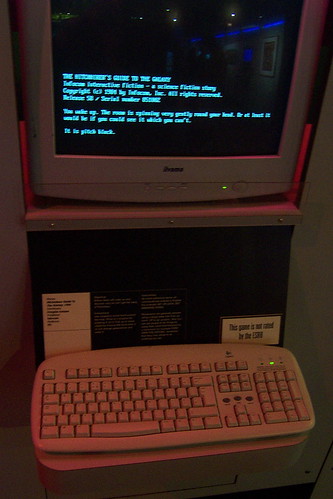Here is another favourite author of mine, Douglas Adams, “with a set of rules that describe our reaction to technologies:”
1. Anything that is in the world when you’re a born is normal and ordinary and is just a natural part of the way the world works.
2. Anything that’s invented between when you’re fifteen and thirty-five is new and exciting and revolutionary and you can probably get a career in it.
3. Anything invented after you’re thirty-five is against the natural order of things.
(2003, p. 95)
I may have already posted this in another MET course, but keep returning to the wry evaluation on the way humans, and in particular teachers, see the technologies in their daily lives. Rarely are students meant to marvel at how an eraser works, they just know it’s there, usually at the other end of their pencils, ready to be used if a mistake is made. Most teachers, I find, are at that turning point between rule two and rule three; perhaps at the beginning of their careers, laptop carts or digital video projectors were brilliant innovations, but now they find tablets and interactive whiteboards a curse inflicted upon their classrooms. Of course, younger teachers, many of us here in the MET program, are eager to make use of these revolutionary technologies, perhaps unheedful of the losses to the teaching profession these items represent.
Adams had his own unique relationship with technological change, starting off his career as a writer for the BBC. Shortly after Star Wars made its debut in 1977, the BBC were looking into sci-fi stories, and the radio show The Hitch Hiker’s Guide to the Galaxy came on the air in 1978. Of course, there’s nothing new about radio plays, having been around for decades before Adams’ birth in 1952. Producing the show, however, took its toll on the BBC, as Adams describes:
I think that the BBC’s attitude towards the show while it was in production was very similar to that in which Macbeth had towards murdering people – initial doubts, followed by cautious enthusiasm and then greater and greater alarm at the sheer scale of the undertaking and still no end in sight.
(1992, p. 9)
The show went on, and became a novel and television series, and eventually a movie. By 1984, a few years before Adams’ 35th year, a video game designer from Infocom collaborated with Adams to make H2G2 into a game, and this classic was born…
…one of the first MUD games I experienced, well before the age of 15! Here is a link to the 20th anniversary edition of the H2G2 game. Enjoy this exciting and new technology.
Kyle
Adams, D. N., (1992). The hitchhiker’s guide to the galaxy: A trilogy in four parts. London: Pan Books.
– -, (2003). The salmon of doubt. New York: Pan Books.



Love the quote. Although I would like to think that the line between those who embrace new technologies and those who do not is more complex than just the person’s age. (-: I have several students who are operating in stage 3 right now. Fighting the use of technology tooth and nail – maybe I should tell them how old they appear by doing so!
Also, wanted to note that I had NO idea what a MUD was. So, I started surfing around and got lots of interesting links to many variations of MUDS.
Thanks. I learned something new….(I also learned that I have no idea how to navigate within H2G2 environment – new or not!)
Thank you for the feedback, Stephanie, and love your gmail pseudonym,
Also a very interesting development with fight some of the students put up, especially if they are at the age when any technology is supposed to be part of the natural world. It reminds me of a line from one of my wife’s favourite picture books, The Seeing Stick by Jane Yohen (2009): “So young… and already so old.”
Glad to hear you gave the H2G2 Mud a spin, and no worries about navigating through the game, I’ve been playing it off and on (mostly off) for years, and I still can barely make it out of Arthur’s bedroom, let alone outside the house to meet the bulldozers.
ALl the best,
Kyle
Hi,
I love the quote! Why is it that we seem less receptive (generally) to changes in technology as we get older? Perhaps we like the way things are, we’ve entrenched in our ways, and don’t want to change? I do, however, know many exceptions to this. My mom (who just turned 71) embraces new technology and takes great pride in being able to figure out how the “new gadgets” work. I hope to be the same when I’m her age.
Deborah
I have witnessed both events (Stephanie’s & Deborah’s points). I think it will come down to personality. Most students are keen to try, some are skeptical and others refuse. I find it interesting when a student doesn’t want to embrace a new technology and then I find out that they are a whiz at a different one. I had a student that refused to do a blog (not a big deal since there were other options). I then found out that he and three other guys won a gaming contest that involved players worldwide in a live tournament through the Xbox. They split $10,000! Seems strange to me that he didn’t want to use the internet…then I realized that he does use it, just not for the purposes that I was encouraging him to use.